Alexander Blok
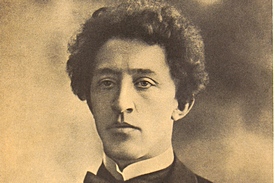
Born: St. Petersburg - 28 November 1880
Died: Petrograd - 7 August 1921
Alexander Blok is one of the most romantic and tragic figures of Russian literature in St. Petersburg. An enormously talented and sensitive poet, his cerebral and exquisitely beautiful verse and his complex, aesthetic worldview were fundamentally incompatible with the rigorous, strictured demands of Soviet culture, leading to a chronic decline in his health and his early death. As an inspiration to younger generations of poets, however, he remained a potent symbol of the vibrant, liberal intellectual world of the so-called Silver Age of Russian letters that came to a brutal end with the October Revolution and Russian Civil War.
Alexander Alexandrovich Blok was born into a prosperous intellectual St. Petersburg family. His father was a lawyer and a professor at Warsaw University, while his maternal grandfather was the botanist and rector of St. Petersburg University, Andrey Beketov, and his mother was a literary translator, critic author of children's verse and of a popular biography of Mikhail Lomonosov. Blok's parents divorced when he was nine, and his mother remarried a Polish-born guards officer.
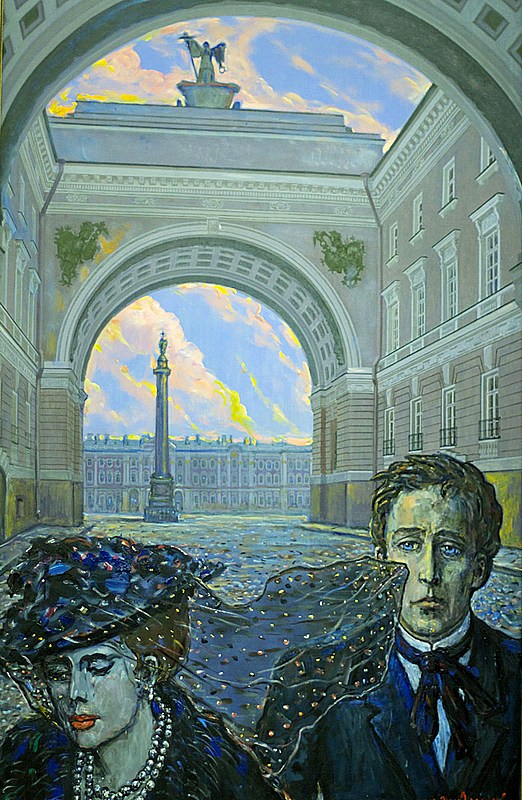
Blok spent his summers at the family estate of Shakhmatovo near Moscow, and it was there as a teenager that he first came into contact with the philosopher and mystic priest Vladimir Solovyov, a distant relative, who had a profound influence on Blok and his contemporary Symbolists. He also discovered the poetry of Fyodor Tyutchev and Afanasy Fet, whose mystical lyricism he developed in his own verse. Blok began writing poetry from a very early age, and created with his brother a hand-written literary journal also in his teens. He also showed an adolescent interest in theatre and an unfulfilled desire to act, possibly under the influence of his future wife, Lyubov Dmitrievna Mendeleeva, daughter of the great chemist Dmitry Mendeleev, whose own country estate was only 8 kilometers from Shakhmatovo. Lyubov would go on to become a professional actress and a historian of Russian ballet.
He was educated at the Vvedenskaya Gymnasium on the Petrograd Side, and then entered the Law Faculty of St. Petersburg University, before transferring to the History and Philosophy Faculty, where he completed his studies in the department of Slavic and Russian languages in 1906. He and Lyubov married in 1903 while he was still a student, and very much in the manner of their era and their caste, their marriage was messily open. Blok had affairs with opera singers and actresses, while his wife's relationship with his equally revered contemporary Andrey Bely was a source of intense emotional turmoil for all three.
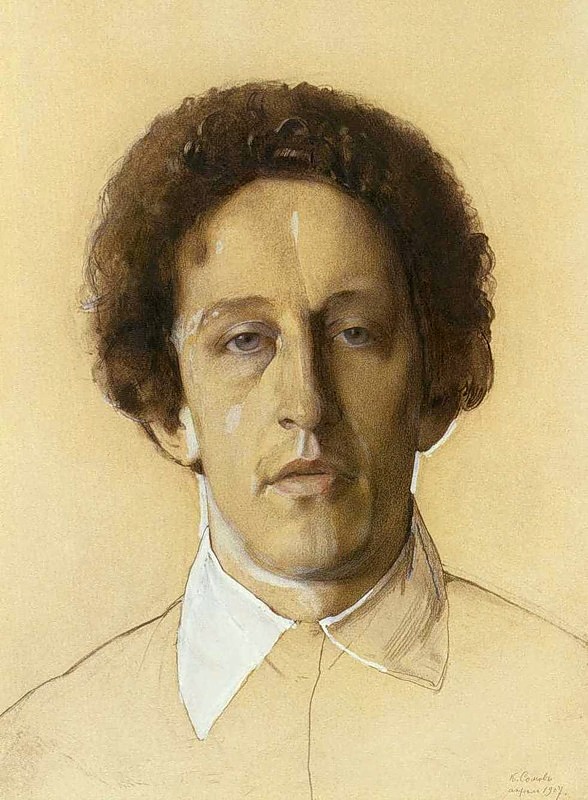
Blok's first collection of poetry, Stikhi o prekrasnoy dame ("Verses about a beautiful lady"), dedicated to his wife, was published in 1905 and won him almost instant preeminence amongst the poets of his generation. He continued to develop his poetry with cumulative success, publishing two more collections in 1907, and by the 1910s he was being hailed as the heir to Pushkin and was the unquestioned star of what would later come to be known as the "Silver Age" of Russian poetry, an idol to a younger generation of poets that included Boris Pasternak, Maria Tsvetaeva, Anna Akhmatova and Vladimir Nabokov, all of whom wrote poetic tributes to Blok. He also wrote drama, but his plays, although highly regarded for their literary value, were never performed in his lifetime and have rarely been staged since.
During the First World War, Blok served with the engineering department of the All-Russian Union of Zemstvos in Belarus. After the February Revolution in 1917, he worked for the commission charged with investigating the crimes of high-ranking officials in the last days of the Tsarist regime, and unlike nearly all of his cultural peers, he welcomed the October Revolution and the Bolsheviks' seizure of power, spurning the opportunity to emigrate and offering himself for government service. His last great poetic work, The Twelve (1918), was a complex allegory that cast twelve Red soldiers on the streets of Petrograd as the twelve apostles. Brutal and highly ironic, it was universally rejected by his former admirers, and only much later recognized as possibly the first great work of Soviet literature, anticipating the ambiguity and courageous experimentation of the literature of the 1920s.
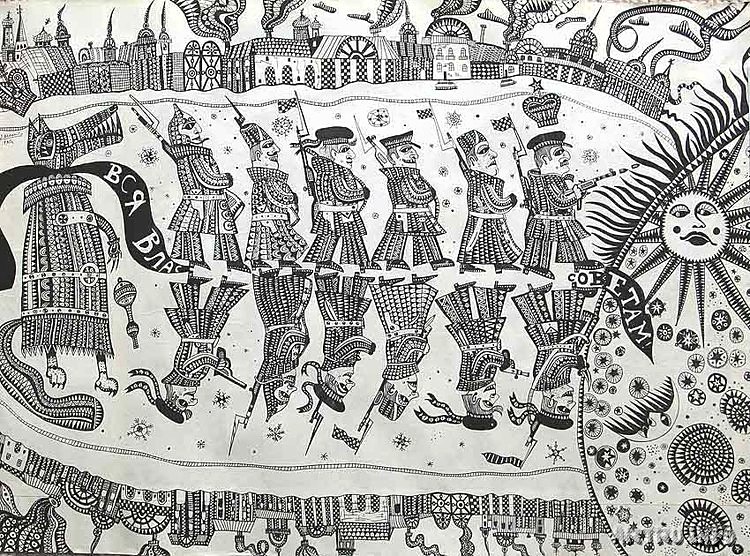
Blok's heavy workload for various state departments and his increasing disillusion with the Revolution - he was briefly arrested and interrogated by the Petrograd Cheka in 1919 - had an increasingly deleterious effect on his health, as did the debilitating poverty he and his family found themselves in. He suffered from asthma and heart trouble, as well as chronic depression that prevented him from writing. At his final public appearance, a lecture to commemorate the anniversary of Pushkin's birth in February 1921, he made public his conviction that "the poet is dying, because he has nothing left to breath. Life has lost all meaning for him". Despite the support of Maxim Gorky and Anatoly Lunacharsky, his doctors' requests to allow Blok to leave the country for treatment were denied until it was too late, and he died on 7 August 1921.
Blok's life and his work were indicative of his age almost to the point of cliché. Blok was a confirmed Symbolist and his verse bore all the stamps of the period - its fetishistic love of "Gypsy" music, its at times hysterical spiritual mysticism, its po-faced conflation of sexual desire with a semi-religious aesthetic fervour. However, Blok's poetry comprehensively transcended the banality of its environment His exceptional sensitivity to the sonic aspects of language, his uniquely complex but equally accessible system of personal symbols and imagery, his ability to juxtapose exalted, opulent language and refined metaphysical reflection with exquisitely observed contemporary urban reality and the vulgar jargon of the St. Petersburg street, and finally his atypical willingness to experiment with angular, discordant poetic forms anticipating the true modernists of the 1920s, all this made Blok one of the greatest voices of Russia's rich poetic tradition and one of the key literary figures of the 20th century.
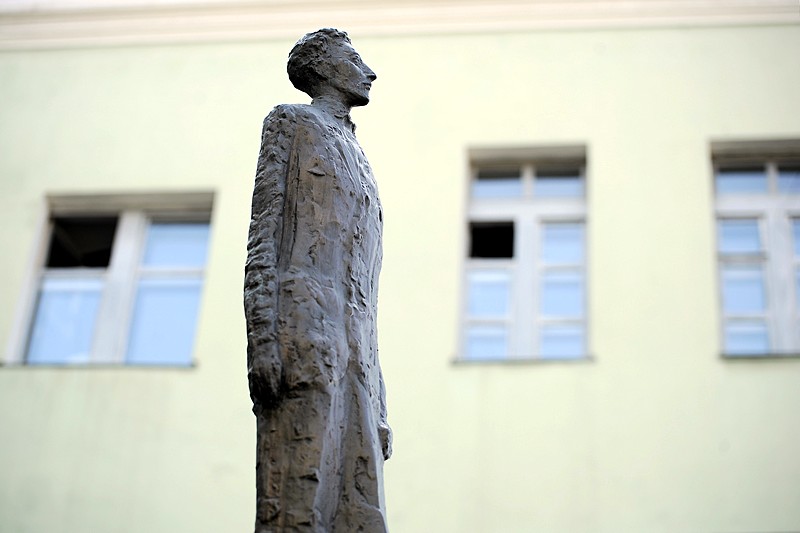
In St. Petersburg, which provided the constant backdrop to Blok's verse and took centre-stage in his collection The City (1904-1908), the Alexander Blok Museum Apartment operates in the apartment where he and his family lived from 1912 until his death, and a nearby street was renamed Ulitsa Aleksandra Bloka in 1939.

